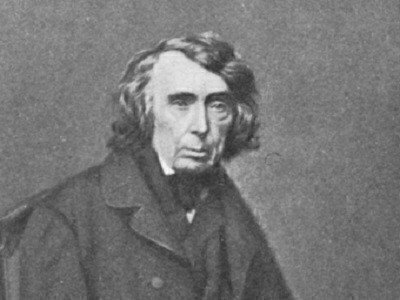On May 28, 1861, Supreme Court Chief Justice Roger Taney directly challenged President Abraham Lincoln’s wartime suspension of the great writ of habeas corpus, in a national constitutional showdown.
Lincon and Taney had not been on good terms prior to Taney’s decision on the habeas question in Ex Parte Merryman, which he issued while acting as a circuit judge. Taney had also written the majority opinion in the controversial Dred Scott case in 1857, a decision than Lincoln publicly criticized in his famous debates with Stephen Douglas. Lincoln also made the Dred Scott decision a central theme of his 1860 presidential campaign.
As Chief Justice, Taney was forced to issue the presidential oath to Lincoln in March 1861, and to listen to Lincoln’s inaugural address, where he again criticized Taney and the Dred Scott decision, but not directly by name.
“The candid citizen must confess that if the policy of the Government upon vital questions affecting the whole people is to be irrevocably fixed by decisions of the Supreme Court, the instant they are made in ordinary litigation between parties in personal actions the people will have ceased to be their own rulers, having to that extent practically resigned their Government into the hands of that eminent tribunal,” Lincoln said.
About three months later, Taney had his chance to address Lincoln’s vision of executive power in Ex Parte Merryman.
Article 1, Section 9, of the Constitution states that “the Privilege of the Writ of Habeas Corpus shall not be suspended, unless when in Cases of Rebellion or Invasion the public Safety may require it.” The Great Writ’s origins go back to the signing of the Magna Carta in England in 1215 and the writ compels the government to show cause to a judge for the arrest or detention of a person.
After the start of the Civil War, President Lincoln ordered General Winfield Scott to suspend habeas corpus near railroad lines that connected Philadelphia to Washington, amid fears of a rebellion in Maryland that would endanger Washington.
On May 25, 1861, federal troops arrested a Maryland planter, John Merryman, on suspicion that he was involved in a conspiracy as part of an armed secessionist group. Merryman was detained at Fort McHenry without a warrant. Merryman’s attorney petitioned the U.S. Circuit Court for Maryland, which Taney oversaw, for his client’s release.
On May 26, Taney issued a writ of habeas corpus and ordered General George Cadwalader, Fort McHenry’s commander, to appear in the circuit courtroom along with Merryman and to explain his reasons for detaining Merryman.
Cadwalader didn’t comply with the writ and instead sent a letter back to Taney on May 27 explaining that Lincoln had authorized military officers to suspend the writ when they felt there were public safety concerns. Taney then tried to notify Cadwalader that he was in contempt of court, but soldiers at Fort McHenry refused the notice.
On May 28, Taney issued an oral opinion, which was followed by a written opinion a few days later. He stated that the Constitution clearly intended for Congress, and not the President, to have to power to suspend the writ during emergencies.
“The clause in the Constitution which authorizes the suspension of the privilege of the writ of habeas corpus is in the ninth section of the first article. This article is devoted to the Legislative Department of the United States, and has not the slightest reference to the Executive Department,” Taney argued. “I can see no ground whatever for supposing that the President in any emergency or in any state of things can authorize the suspension of the privilege of the writ of habeas corpus, or arrest a citizen except in aid of the judicial power,” Taney concluded.
However, Taney noted that he didn’t have the physical power to enforce the writ in this case because of the nature of the conflict at hand. “I have exercised all the power which the Constitution and laws confer on me, but that power has been resisted by a force too strong for me to overcome,” he said. But Taney did order that a copy of his opinion be sent directly to President Lincoln.
Lincoln didn’t respond directly or immediately to the Ex Parte Merryman decision. Instead, he waited until a July 4th address to confront Taney at a special session of Congress.
“Soon after the first call for militia it was considered a duty to authorize the Commanding General in proper cases, according to his discretion, to suspend the privilege of the writ of habeas corpus, or, in other words, to arrest and detain without resort to the ordinary processes and forms of law such individuals as he might deem dangerous to the public safety,” Lincoln said. “This authority has purposely been exercised but very sparingly.”
Lincoln then presented his famous response to Taney. “Are all the laws but one to go unexecuted, and the Government itself go to pieces lest that one be violated? Even in such a case, would not the official oath be broken if the Government should be overthrown when it was believed that disregarding the single law would tend to preserve it?”
The President also confronted Taney’s opinion that only Congress could suspend the writ.
“Now it is insisted that Congress, and not the Executive, is vested with this power; but the Constitution itself is silent as to which or who is to exercise the power; and as the provision was plainly made for a dangerous emergency, it can not be believed the framers of the instrument intended that in every case the danger should run its course until Congress could be called together, the very assembling of which might be prevented, as was intended in this case, by the rebellion,” Lincoln argued.
After the Merryman incident, Lincoln suspended the writ in other situations, and he received approval from Congress in March 1863 to suspend the writ for the duration of the conflict when “the public safety may require it.”







